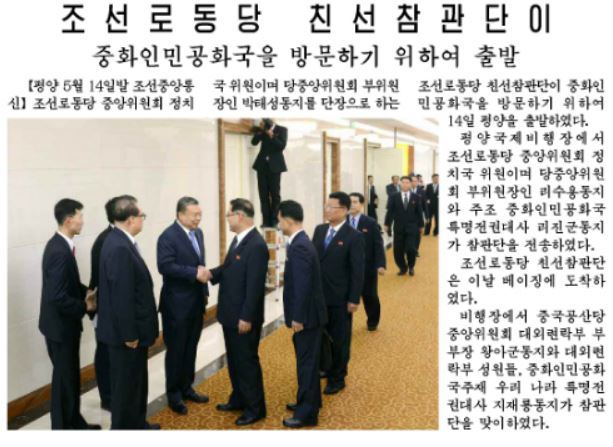 |
|
North Korea’s state-run paper Rodong Sinmun ran a story about a “goodwill observation group” that took a surprise visit to China on May 14.
|
“Goodwill observation group” hints at possible economic reform and opening
Amid growing interest in cooperation between North Korea and China following two summits between North Korean leader Kim Jong-un and Chinese President Xi Jinping just 40 days apart, a high-ranking delegation of North Korean officials paid a surprise visit to China on May 14, visiting high-tech economic and agricultural sites in the country over the course of two days. North Korea’s state-run Rodong Sinmun and Korean Central News Agency reported that a “goodwill observation group from the North Korean Workers’ Party” (KWP) led by KWP Vice Chairman Pak Tae-song had departed Pyongyang en route to China on May 14. The group also included Kim Nung-o, KWP committee chair for North Pyongan Province; Kim Su-gil, KWP committee chair for Pyongyang; and Ryu Myong-son, vice director of the KWP International Department (presumed to be a former bureau chief in the Ministry of Agriculture). The group’s visit to China appears to be a follow-up measure to the new strategic line adopted in the 3rd Plenary Session of the 7th KWP Central Committee, namely to “focus all energy on building a socialist economy.” In addition to this, numerous experts believe that the visit has a number of strategic goals, which include deliberating the North Korea-China economic cooperation that is expected to accompany inter-Korean economic cooperation after tensions are eased following the North Korea-US summit and ultimately to explore the possibility of economic reform and opening under the auspices of Kim Jong-un. In fact, Park Tae-song and Kim Su-gil were discussants about a “revolutionary transformation of scientific education programs,” which was the theme of Kim Jong-un’s second parliamentary report during the Central Committee’s plenum. At the time, Kim proposed the strategic slogan of “advancing through science and guaranteeing the future through education” while calling for North Korea to improve its national status in terms of technology and talented individuals. On May 14, the first day of the visit to China, the North Korean group visited the text and information center at the Chinese Academy of Science at Zhongguancun, which is referred to as China’s “Silicon Valley.” Located in a university district in western Beijing, Zhongguancun is a cradle of entrepreneurship that hosts more than 20,000 high-tech technology companies. All of China’s world-class companies – including Baidu, Lenovo and Xiaomi – got their start here. On May 15, the North Korean group stopped by the Institute of Cereal Science at the Chinese Academy of Agricultural Sciences and an exhibition hall on agricultural technology. Here at the site of China’s cutting-edge agricultural technology, the officials traded ideas with industry insiders. After that, observers say, the group may have stopped by Tianjin, one of the areas that is under development in an attempt to integrate China’s Jingjinji Metropolitan Area, consisting of the cities of Beijing, Tianjin and Hebei, or by the Xiong'an New Area, which Xi Jinping has been actively developing. Since the North Korean group included the KWP committee chair of Pyongyang, which is the site of the Unjong High-Tech Development Zone and the Kangnam Economic Development Zone, and KWP committee chair of North Pyongan Province, which is the site of the Sinuiju Special Administrative Region (a special economic zone) and the Chongsu Tourist Development Zone, some analysts think that North Korean leader Kim Jong-un may be starting to take steps toward reform and opening. “The fact that party committee chairs from a city and province personally visited sites at which China has made major progress on economic development appears to be related to economic development zones in North Korea. The apparent objective is to attract Chinese capital and companies when sanctions are rolled back in the future,” said Koo Kab-woo, professor at the University of North Korean Studies. “They are testing the possibility of cooperation with China,” said Yang Mun-su, a professor at the University of North Korean Studies. “It looks like North Korea and China will naturally end up discussing economic cooperation with a focus on information technology,” said Cho Bong-hyun, vice director of the IBK Economic Research Institute. By Noh Ji-won, staff reporter Please direct comments or questions to [english@hani.co.kr]






